Best Birthday wishes to IM Richard Adam Bates born on this day (January 27th) in 1979.
Richard has won the Southern Counties (SCCU) championship in the 2015-16, 2016-17 (with Nick Pert) and 2017-18 seasons.
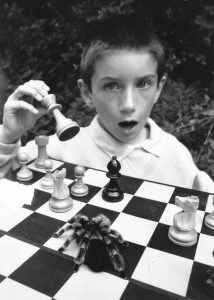
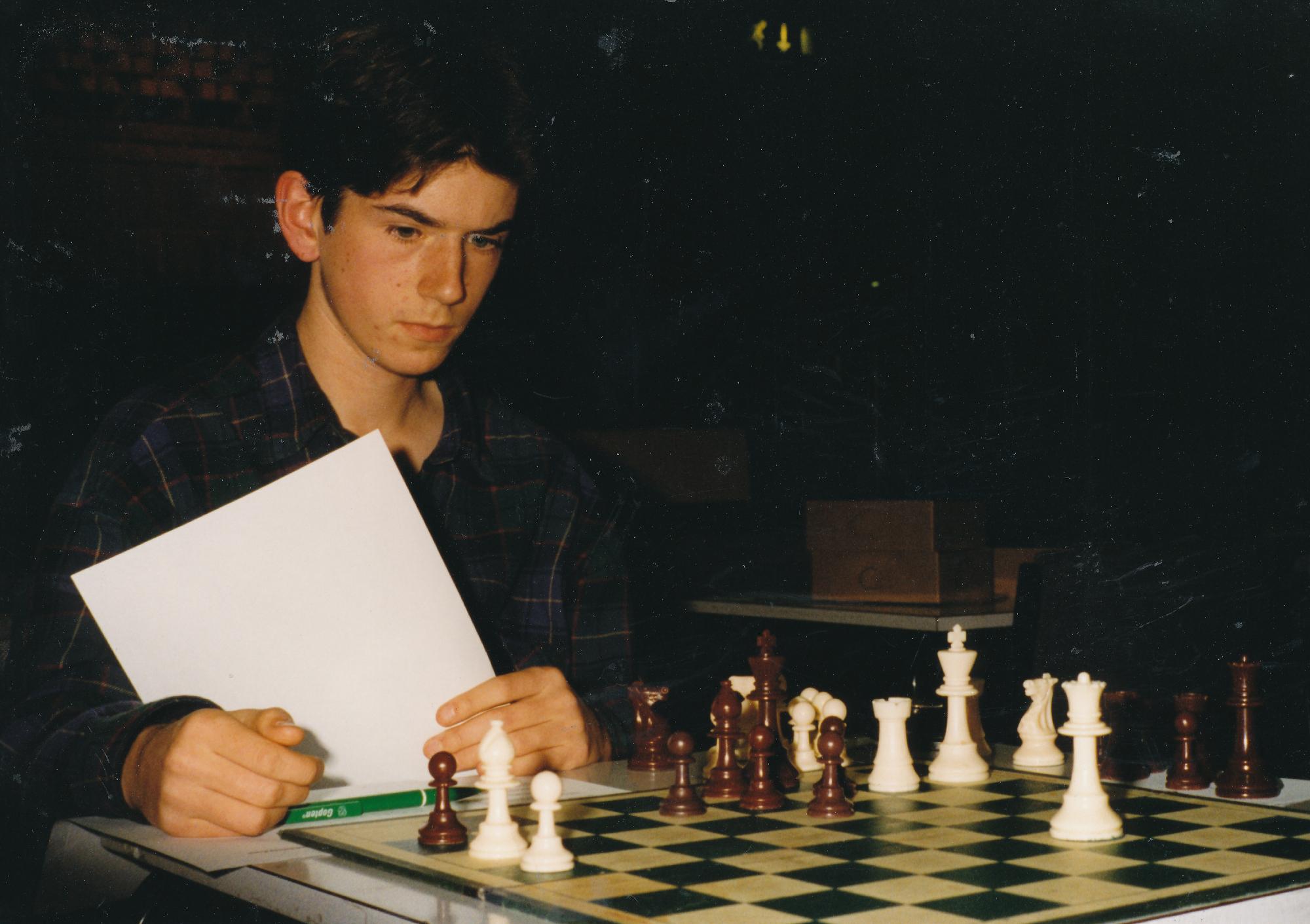
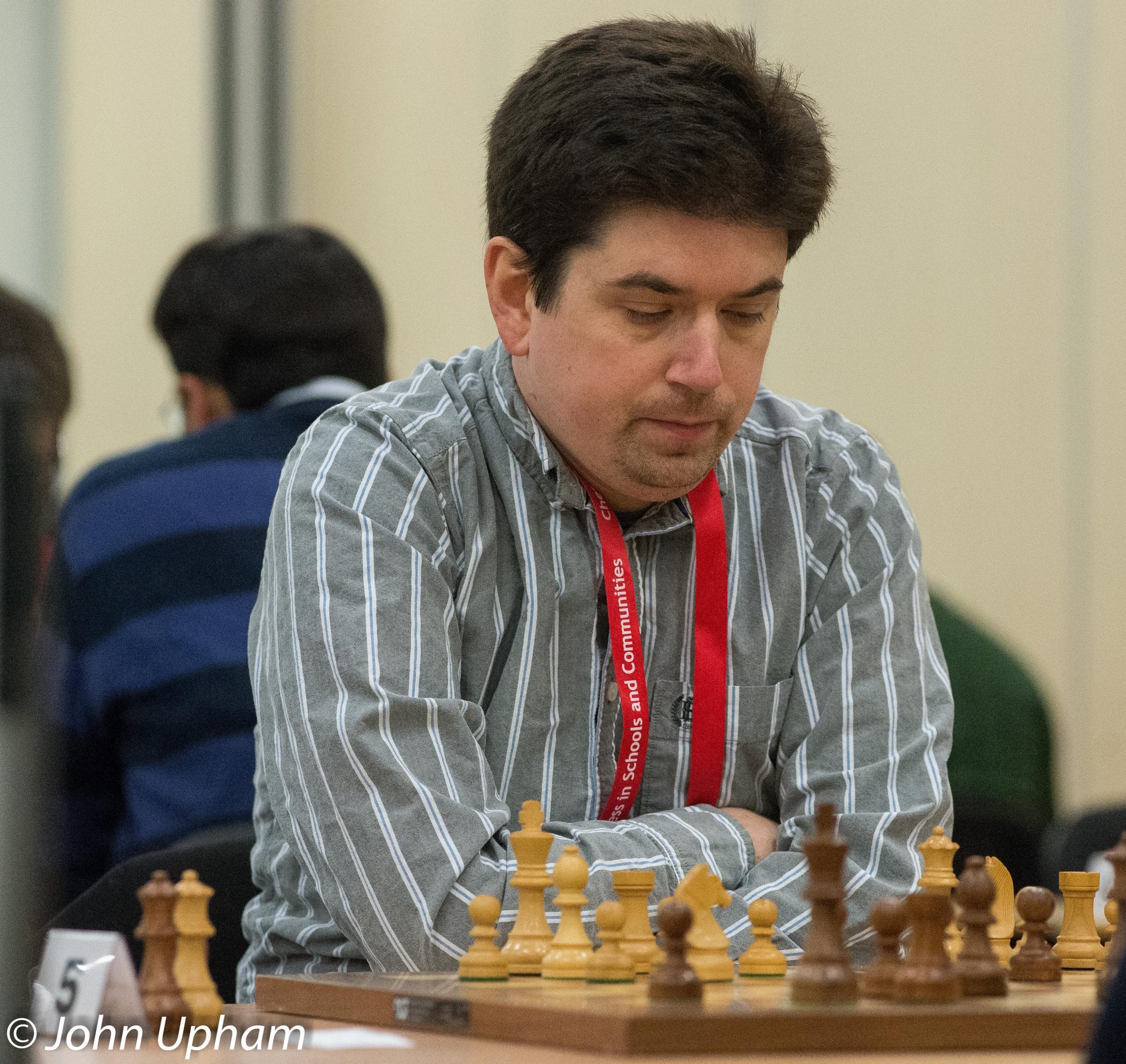
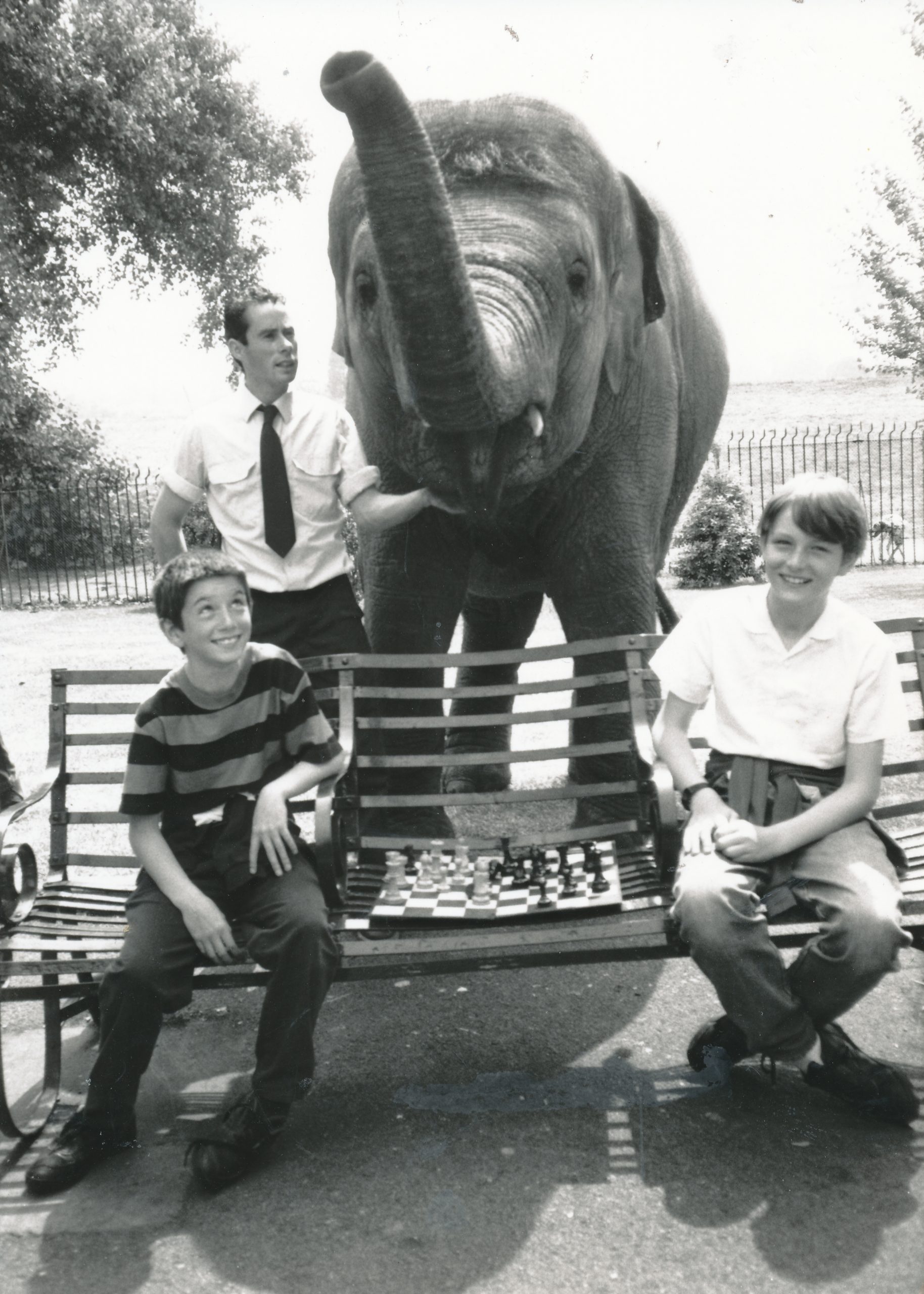
Best Birthday wishes to IM Richard Adam Bates born on this day (January 27th) in 1979.
Richard has won the Southern Counties (SCCU) championship in the 2015-16, 2016-17 (with Nick Pert) and 2017-18 seasons.




We remember Edith Baird (née Winter-Wood)
Edith Elina Helen Winter-Wood was born, probably in 1859*, to Thomas Winter-Wood, a writer and poet, and Eliza Ann (née Sole) Winter-Wood in Boulogne, France.
(*Despite 22nd February 1859 appearing in Wikipedia we are unable to locate a primary source for this date. Contemporary secondary sources always just gave 1859 as her year of birth. Census records imply that she was born between April 1859 and March 1860. Her marriage record from 1st December 1880 describes her as being ‘of full age’: at least 21 years old, so born before December 1859. However, her death record from 1st February 1924 gives her age as 63, implying that she was born between February 1860 and January 1861. Either her death record is incorrect or she added a couple of months to her age when she married. )
Many secondary and tertiary sources incorrectly give the Winter-Wood family home of Hareston Manor (now a venue for weddings) near Brixton, Plymouth, Devon as her birthplace.
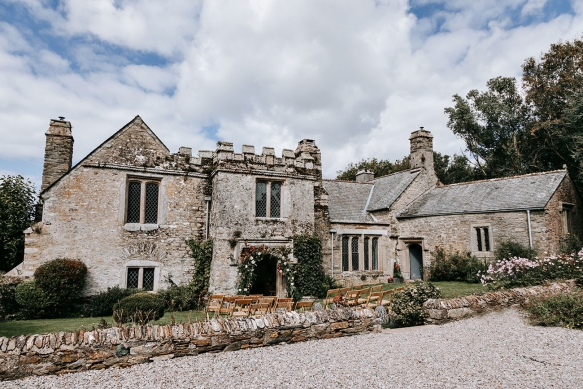
The family was resident in Boulogne in at least 1858 (as discussed below) and a UK birth certificate for Edith does not appear to exist. Having said that, a French birth certificate has yet to be located. Both Brian Denman and Chris Ravilious are satisfied that Edith was born in Boulogne and various census records attest to this. Ed: both Richard James and myself (JEU) have examined the evidence carefully and Boulogne would appear to be correct.
Thomas Winter-Wood was born in Har(e)ston, Devon in 1819 and was himself a strong player having been educated at Plympton Grammar School (now known as Hele’s School). Thomas was the son of John Wood-Winter who, in 1824, reversed the order of the family surname. Thomas sold the family estate leaving the Winter-Woods with substantial means, with each family member able to pursue their leisure interests whilst retaining a number of domestic staff.
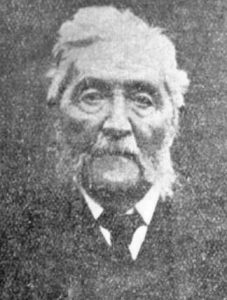
Thomas taught all of his family to play chess and Edith learnt at an early age. Both Edward J and Carslake W also learnt early on, Edward (aged 11 in 1858) played members of Boulogne Chess Club giving them rook odds and ten years later Edward joined London Chess Club.
According to Tartajubow :
“(Edward) played in several tournaments and in blindfold simuls he drew two games against Lowenthal and one against Blackburne. In 1878 he joined the Croydon Chess Club and once in one of their tournaments scored 23-7. He also enjoyed success in many other club tournaments, correspondence chess and problem solving tournaments. Many of his problems appeared in leading publications of the day.”
and, also according to Tartajubow :
“Her other brother, Carslake W. Wood (1849 – 1924), lived with his mother’s brother, Major Sole of the 5th Militia of West York, in Torquay. While travelling Europe with the Soles, he also developed a taste for painting and on many occasions donated his paintings as prizes in chess tournaments.”
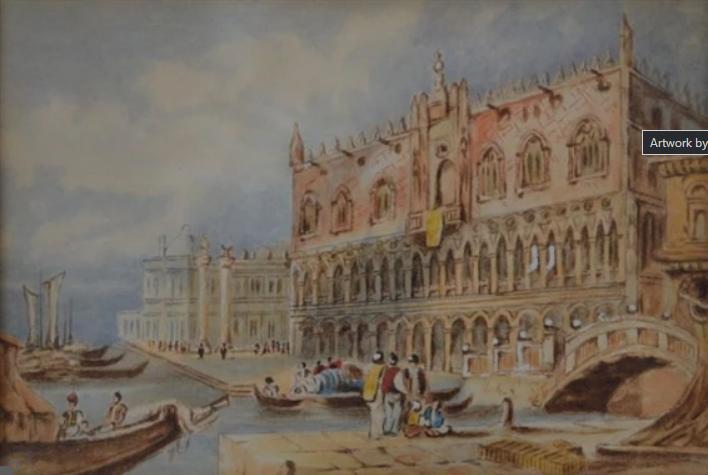
According to F. R. Gittins (in The Chess Bouquet 1897):
“The moves came to her, as she says, by a kind of instinct before she was out of her first decade. She did not, however, commence composing problems until some years after her marriage, which took place in 1880, to Deputy Inspector-General W. J. Baird, M.D., R.N., whose distinguished services have been mentioned in despatches and rewarded with four medals and two clasps. Eight years later she composed her first problem, and commenced a wonderful series of successes, having gained eleven first, nine second, and six third prizes, and been honourably mentioned nine times.”

According to the old ChessDevon web site (sadly only available via the WayBack Machine)
“In 1893, for instance, she entered The Hackney Mercury 3-mover tournament, with a limit of 6 pieces. Most of the great composers of the time had entered, – B. G. Laws, P. H. Williams and James Raynor among them, but she won 1st prize. As one American critic observed, ‘The fact that the tourney assumed an almost international character rendered the triumph of the distinguished lady victor as noteworthy as it was creditable’.”
Here is this first prize (1):
Baird, Edith Elina Helen
Hackney Mercury, 1893
1st Prize
The problem solutions may be found at the foot of this article.
She very quickly progressed and was soon producing problems that were described as being “exceedingly pretty” and which ‘displayed unmistakable aptitude for the intricacies of chess.’ Her work 700 Chess Problems was published by Henry Sotheran Ltd in 1902 and took her 14 years to complete.”
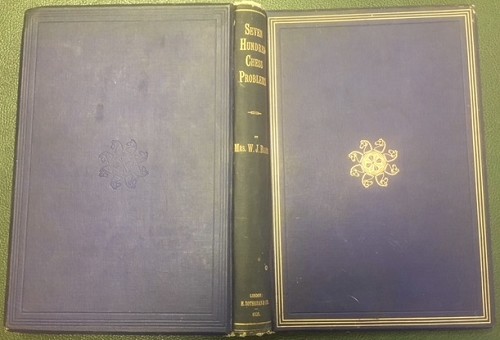
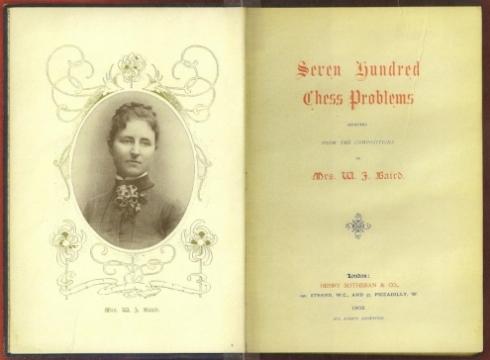
700 Chess Problems may be downloaded from here.
Edith also had a brief career in chess competitions in the 1890s, winning the 1897 Sussex Ladies Championship without losing a game.
Few samples of her play survive, but they show her to be a proficient player with, as you might expect from a problemist, a keen tactical eye. In this game she finishes neatly with a queen sacrifice.
In this game, from a blindfold simul against the London-based Dutch organist and chess master Rudolf Loman (1861-1932), she uses a tactic to reach an equal ending.
According to the 1871 census the Winter-Wood household lived at “Hareston”, Tavistock Road, Croydon, Surrey and consisted of Thomas (52 and Landowner), Eliza (44) plus Edith’s brothers Edward J (23 and Banker) and Carslake W (22 and retired banker), Marie A (17), Edith (11) plus three (!) domestic servants.
In 1880 (‘of full age’) Edith married the Deputy Inspector-General of Fleets and Hospitals, William James Baird, MD, of the Royal Navy, in the parish church of St George Hanover Square. (You’ll see that she married under the surname Wood rather than Winter-Wood.) William was almost thirty years her senior, having been born in Londonderry in 1831. The 1881 census found them in lodgings in Durham House, Hotspur Street, Tynemouth, North Tyneside: presumably William was there in connection with his work. Later the same year, their only child, Lilian Edith Baird, was born in the same place.

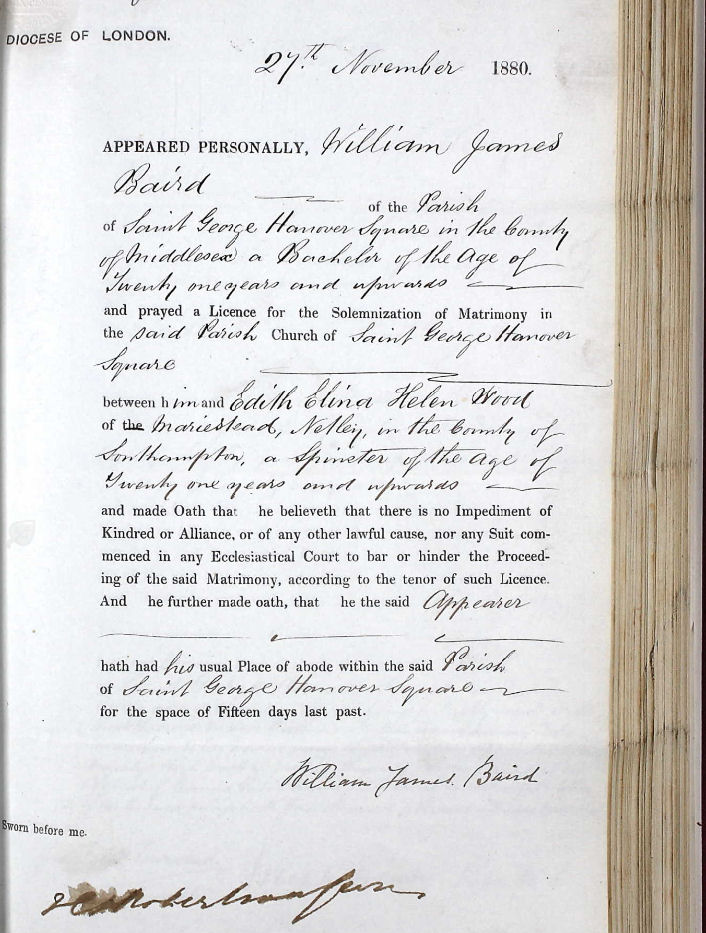
Lilian would become a child prodigy whose first problem was published before she was 10 years old. She was also an accomplished poet and painter like her mother. Although she had over 70 problems published by the age of thirteen, Lilian gave up chess composing while still in her teens.

(Lilian merits a full article in this place in her own right : added to ToDo list!)
By 1891 William had retired and the family had settled in Brighton living at 14 College Terrace, where they employed a servant, Louisa Howard (23). In 1901 the census enumerator found them at the same address, their servant now being Lilian Millard (25).
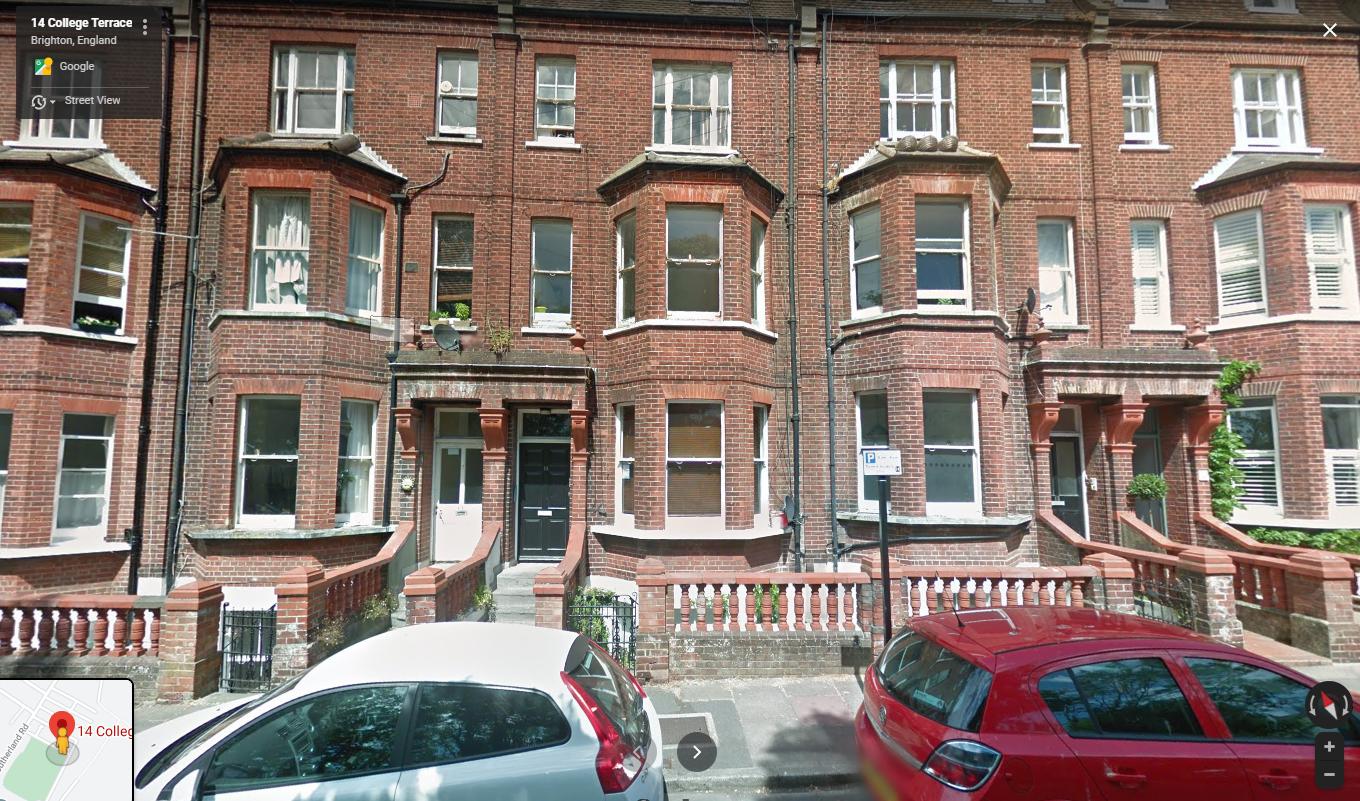
William died in 1907, and Lilian had married in 1910: the 1911 census found Edith living in a boarding house named Mountcoombe in Surbiton. The house no longer exists, but its name, minus a letter, survives in Mountcombe Close, now a location for residential flats. Shortly afterwards, she joined her brothers in Paignton, Devon, close to her family’s ancestral roots.
Returning to Edith’s family, by the time of the 1881 census the Winter-Wood household (bar Edith) had relocated to “Mariestead”, Netley Abbey, Southampton and had shrunk to Thomas, Eliza and a mere two servants. Edith gave this address when she married William Baird.
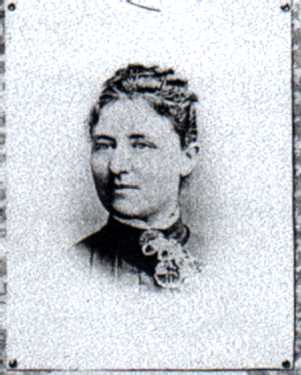
In the 1891 census the Winter-Wood household consisted of Thomas (72), Eliza (64) plus Edith’s brothers Edward (43) and Carslake (42) all of whom were described as “living on means”. They had returned to three domestic servants : Mary Scoble (65), Carrie Stephens (22) and Kate Truman (just 12). They lived at 14, The Crescent, Plymouth, PL8 2AP. Nothing remains of this property, it would appear. By 1901, the family had moved again, to “Kenwick”, Paignton, Devon. They were back down to two servants: Florence Gagg (18) was the housemaid and Sarah Chambers (59) the cook. Thomas died in 1905, and the 1911 census gives their address as “Hareston”, Totnes Road, Paignton. Eliza, Edward and Carslake’s servants were now Laura Ellen Gagg (25 – presumably related to Florence) and Sarah Tulley.
In an interview with the Westminster Gazette (1st September 1894) Edith was asked why chess has always been a man’s game.
“Frivolous and fashionable women would begrudge the time and thought it requires; busy mothers of families could not, of course, spare time for it, and the great majority of unmarried girls have not, I’m afraid, the necessary patience. Then, too, it is, I must confess, an unsociable game. It is most suitable for quiet and reflective people, and for invalids. It seems always to have attracted clever strategists like military and naval commanders, and also great politicians. I wish girls would take to it more, because it is such excellent mental discipline, and brings out one’s patience. It would also be a useful corrective to the tendency to jump at conclusions which many women have. The great charm is that it is a home accomplishment. A woman is not expected to leave her fireside for the sake of chess. It is a stable kind of amusement for which she never need sully her womanliness or her good reputation. Many of the outdoor sports, innocent and healthy enough, lead to a great deal of flirtation and general frivolity.”
F.R. Gittins (op. cit.) described her as follows:
“Mrs. Baird, however, is something more even than the Queen of Chess-problem composers. She is, for example, an enthusiastic and skilful archer, and, living as she does in Brighton, has for some time been a prominent member of the Furze Hill Archery Club, of which she is a member of the committee, and in which, she has, for two years in succession, taken the medal for the highest aggregate score of the season. She also paints and illuminates charmingly, and has a pretty inherited talent for writing verse. Her book of illuminations, in fact, is described as “so chaste and delicate in design as to recall the ancient illuminated books which are treasured in museums and art galleries.” In politics she is a staunch Liberal, while the modern movement against all cruelty to animals – whether inflicted under the name of sport or in the interests of science – finds in her one of its most ardent champions. Besides the déclassement derived from chess, she is also a great believer in girls making themselves independent of marriage, from a monetary point of view, by having a definite occupation. When it is added that she never allows chess, painting, or any other favourite pursuit to occupy her time until all the domestic matters of home have been seen to, we have said sufficient to show how finely-rounded and complete a life this brilliantly clever woman leads. It is only left to add that her manner is kind and charming, and that she is thoughtfulness and considerateness itself to all her friends. She is, moreover, the most loving of mothers, and has been heard to declare that if anything were to happen to “Lily”, she would never compose another chess problem.”
Edith was also an avid bicyclist who was known to have ridden 25 miles (on one of those old style bicycles) to discuss an adjourned chess game.
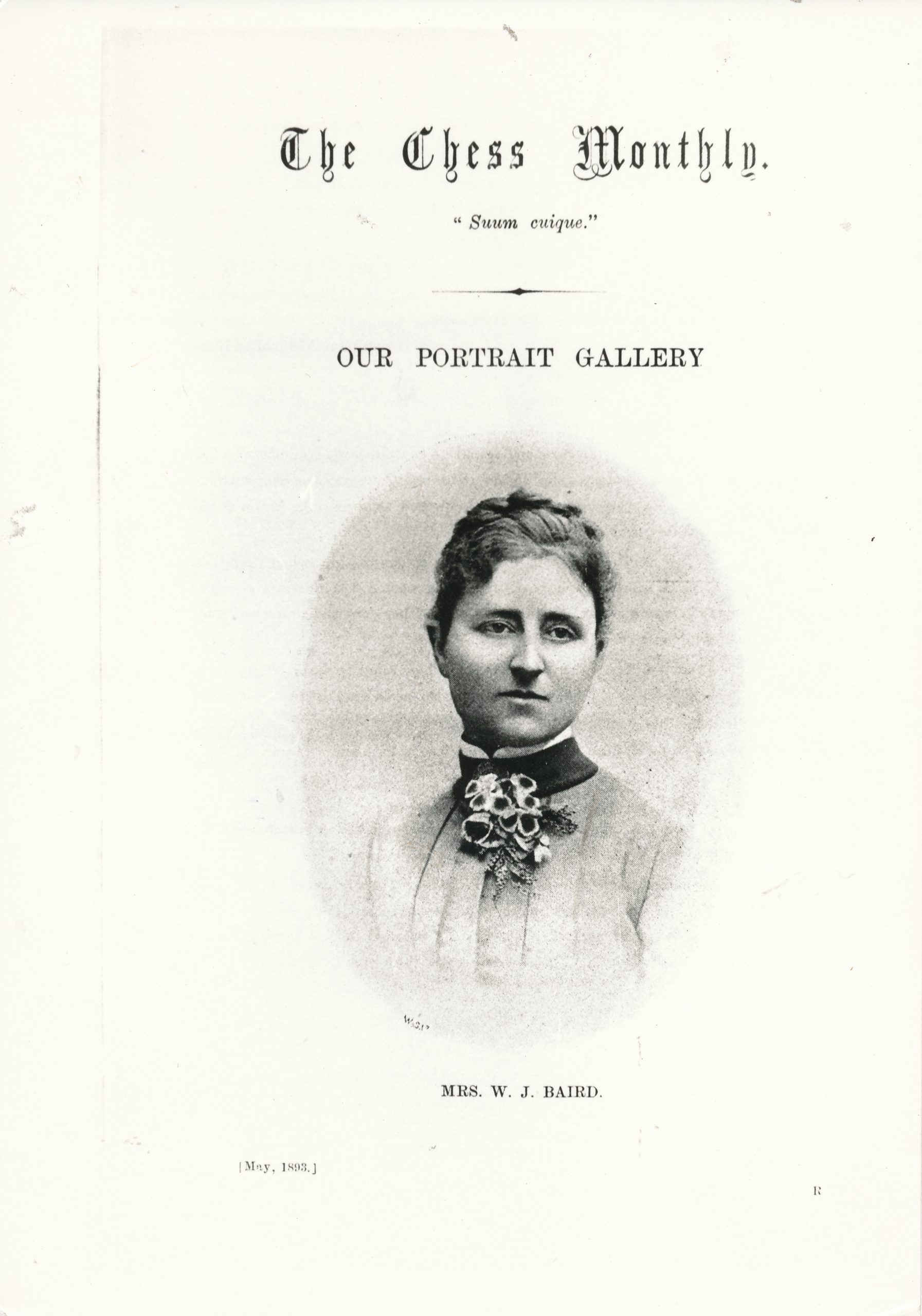
On Friday, February 1st, 1924 Edith passed away. The probate record is dated April 29th and was granted to Herbert Percy Strong, a Lieutenant-Colonel in the Indian Army, who was Lilian’s husband. The initial value of the effects was £18110 5s 7d which was subsequently resworn to £16627 13s 11d.

Both Sunnucks and Golombek are silent on Edith. This is somewhat surprising since Anne liked to mention female players and problemists.
From The Oxford Companion to Chess by Hooper & Whyld :
EDITH ELINA HELEN (née Winter Wood) (1859-1924), British problem composer. Her parents, two brothers, and daughter were all good players or clever problemists.
She composed over 2,000 problems which were not profound but were noted for their soundness; only a dozen or so were faulted. Her Seven Hundred Chess Problems was published in 1902. She became deeply absorbed in retractors, and her other book The Twentieth Century Retractor appeared in 1907. They are two of the most beautiful chess books ever to appear, printed and bound by the King’s printer Henry Sotheran, and sold at less than cost.
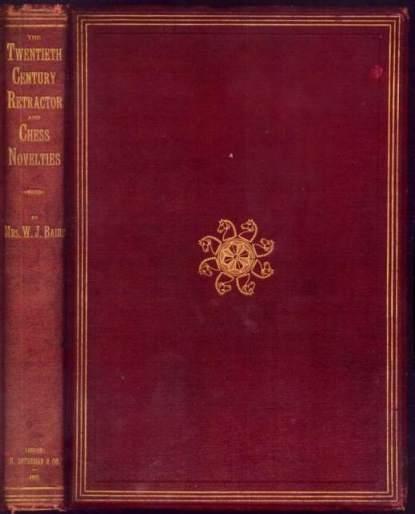
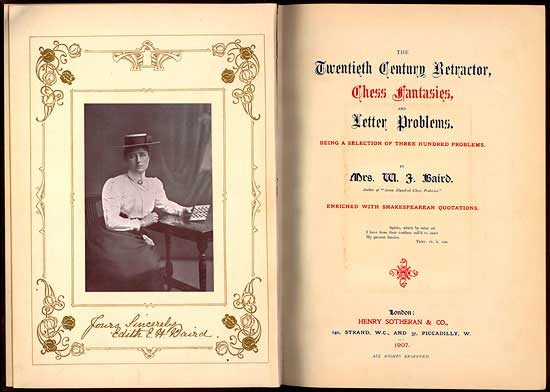
The Twentieth Century Retractor may be read online here.
The dedication for The Twentieth Century Retractor was somewhat unusual :
“Dedicated to
The Sun
The Glorious Orb which
Animates and Beautifies
The Earth
By Giving It
Warmth, Light and Life”
and Edward Winter discusses the beauty of the book in Chess Note 3164.
From British Chess Magazine, Volume XLIV, (44, 1924), page 103 we have this brief obituary notice written by RC Griffth :
“We much regret to hear of the death, at Paignton, on February 1st, of Mrs. W.J. Baird, much of the distinguished of women problem composers throughout the world. As our problem editors will no doubt deal fully with her work and her triumphs, we shall say no more here that she took a keen interest in chess over-the-board also, and in 1897 secured the county championship of Sussex among players of her own sex. By birth she was a Winter-Wood and thus a member of a distinguished West of England chess family”
From British Chess Magazine, Volume XLIV, (44, 1924), page 125 we have this obituary written by RC Griffth :
“A deep shadow has been cast over the chess world by the death of Mrs. W.J. Baird, which occurred on 1st February last at Paignton. The end was most unexpected, but it is a comfort to her relatives that the passing away was peaceful. She was the daughter of Mr. T. Winter-Wood, who and whose family have been identified with chess for generations. She was born in 1859 and composed her first problem in 1888, and it was not long after this date that she was given the title of the “Queen of Chess,” since not only did she distinguish herself in a happy way as a prolific composer, but proved a valiant opponent over the board, testified by her securing the ladies’ championship of Sussex in 1897.
Mate in Two (2)
Among her other accomplishments were painting, particularly illuminating, poetry (which may have been inherited from her gifted father) and archery, in which sport she was skilful. Her chess problems were generally of the light texture order never profound, but always pleasing to the ordinary solver. She must have composed over 2,000 problems of one sort or another, and this large output in about thirty-five years could not be conducive to highest results. Her problem tourney honours were numerous, though she did not as a rule see these, generally entering her problems to oblige admiring conductors of competitions.
Mate in Two (3)
In 1902 she published Seven Hundred Chess Problems and in 1907 The Twentieth Century Retractor, Chess Fantasies and Letter Problems, 320 illustrations (Sotheran & Co.). Both were editions de luxe. Mrs. Baird was credited with the being the originator of the complicated retractor of which she was a proficient exponent, but since she ceased composing these fancies, interest in them has waned.
Mate in Three (4)
During the last few years her activity, after a period of quiescence has been marked, her attention being directed principally to ‘Mutates’ and Picture or Letter Problems. In addition to the enthusiasm which, shown by her actual work, she has generously promoted several competitions, one still current in the Morning Post, particulars of which we announced last month. A remarkable feature of the deceased’s problems was their soundness less than one per cent. being cooked after leaving her hands, evidence of painstaking application!
Mate in Three (5)
There is now, since the decease of Mrs. Baird’s father, Mr. T. Winter-Wood and her brother, Mr. E.J. Winter-Wood, only Mr. Carslake Winter-Wood left to represent the family in the chess circle, Mrs. Strong, her daughter, who at one time promised to emulate her mother, having apparently abandoned the game and its problems. There can be no question that Mrs. Baird stood in front of all lady composers, her nearest rival probably being the late Mrs. T. B. Rowland, and indeed a number of her compositions rank high in the world’s collection. We have not space this month to quote specimens, but hope to do so next issue.
Mate in Three (6)
Since the above was in type we have been informed of the sudden death of Mr. Carslake Winter-Wood on the 24th February.”
The Late Mrs. W. J. Baird,
The Masters said:-
“Lay by the board, the problem is not sound;
There’s none can solve unless a Morphy’s found.”
* * *
A knight I saw, his royal head bowed;
Methought a bishop moved and prayed aloud.
The Queen, alas, and their attendants gone,
Only did the Kings linger sadly on.
And roaming far afield a Rook forlorn,
And here and there a long-forgotten pawn.
“Oh! is there none who can this problem solve?”
“Seek her round who our highest hopes revolve”
And so we brought it to our ‘Problem Queen’
Who faced the field with heart and eye serene.
* * *
“Go leave me now and I will rest awhile,”
Then hand outstretched and swift triumphant smile :
“The Bishops move! with him the key,” she cried –
“Life’s problem solved at last! I’m satisfied.”
M.S.M.
White retracts his last move; then plays. Black moves so that White can mate at once. (7)
(Please note that there are factual errors in most of the sources quoted below.)
Here is her Wikipedia entry
Here is more from chessproblem.net
Article from Tartajubow (but the author mistakenly conflates Edith and Lilian) on Edith Baird and other Bairds
Queens of Problem Chess by Satanick Mukhuty from chessbase.com
More from Sarah Beth Durst (aka BatGirl), quoting from Gittins.
Via the Wayback Machine Chess Devon have this excellent article
British Chess News would like to thank Brian Denman for providing a file of Edith Baird’s games, and Tim Harding, for sending us the pdf of The Chess Bouquet.
Solution to problems:
(1)
1.Qg7! (2.Qc7#)
1…Kc6 2.c5 Kxc5 3.Qc7#
1…Kxc4 2.Qd4+ Kb3 3.Qb4#
1…Kb6 2.Sb5 Ka6/Ka5, Kc6/Kc5 3.Qa7, Qc7#
1…Kd6 2.Sb5+ Ke6, Kc7/Kc5 3.Sd4, Qc7#
(2) 1.Bg2
(3) 1.Qb2
(4) 1.Qh8
(5) 1.Nc1
(6) 1.Rd8
(7) White retracts Nd5xRb6, then 1. Nd6 Rc6 2. Nb7#
We remember Hugh Alexander who passed away on Friday, 15-ii-1974. The death was registered in the Borough of Cheltenham. Currently his burial / cremation site is unknown.
Conel Hugh O’Donel Alexander was born on Monday, April 19th, 1909 in Cork, Munster, Republic of Ireland.

Hugh’s parents were Conel William Long Alexander (1879-1920) and Hilda Barbara Alexander (née Bennett) (1881-1964) who married in Hook Church, Hampshire. His father was a Professor of Civil Engineering from County Donegal and his mother was the daughter of a timber merchant and was from Birmingham.
Hugh’s father moved to Hook in Hampshire. At some point they returned to Cork and then relocated to Birmingham.
In the 1911 Irish census aged two Hugh was recorded as being a Presbyterian. The household consisted of his father, mother and two servants Maud McAuliffe (19) from County Cork and Johanna Hanlon (20) from Cork City all living at 20, Connaught Avenue, Cork.
At the time of the census all members of the household were capable of reading and writing apart from Hugh who was recorded as “cannot read”.
and Hugh’s father signed the Return as follows :

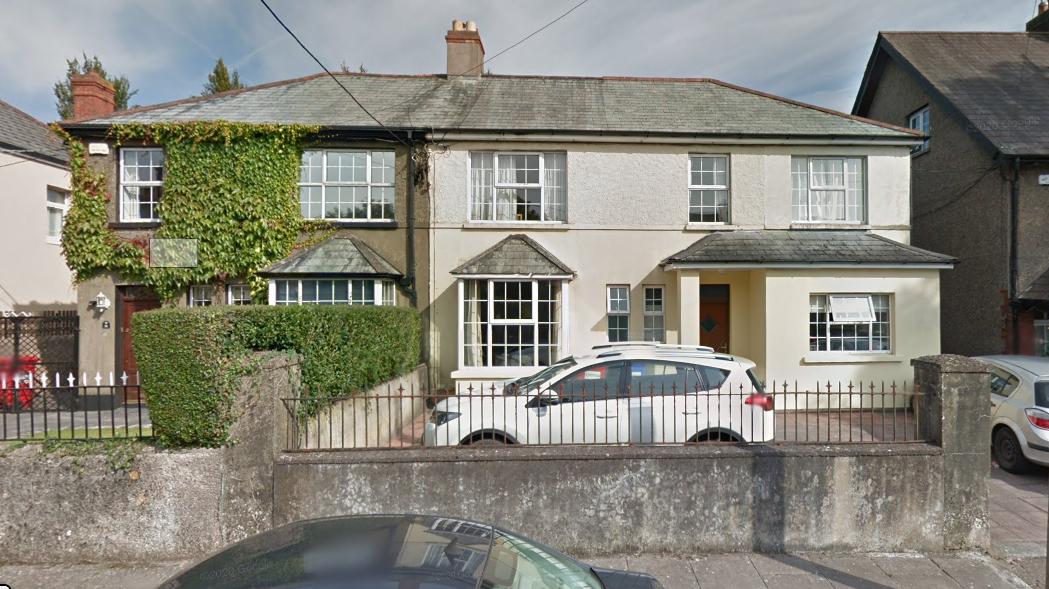
Hugh attended Londonderry College and then went to King Edward’s School, Birmingham.
Hugh married Enid Constance Rose Crichton Neate (1900-1982) in October 1934 and the marriage was registered in the district of Westminster, Middlesex.
According to Rodric Braithwaite :
“Enid, was an equally striking personality. She was descended from one of the defenders of the Eureka Stockade, the “birthplace of Australian democracy”. She was educated at the Sorbonne, a formidable dialectician, art historian and collector. In her later years she returned to Australia, where she was endlessly hospitable to passing Russian chessplayers, and to itinerant musicians, including my own father.”
Hugh and Enid had a son Michael (19 June 1936 – 1 June 2002) who became the foreign policy secretary to Margaret Thatcher and the UK ambassador to NATO. Here is Michael’s obituary.
Michael married Traute Krohn. Michael and Traute gave Hugh a grandson, Conel Alexander who is a Cosmochemist at the Earth and Planets Laboratory, Carnegie Institution for Science, Washington.

Prior to the second world war Alexander was officially employed by John Spedan Lewis in his Department store in Oxford Street. When he returned from Buenos Aires (“good air”) from the 1939 Olympiad he travelled aboard the RMS Alcantara. Here is the entry in the passenger list for September 19th, 1939 :
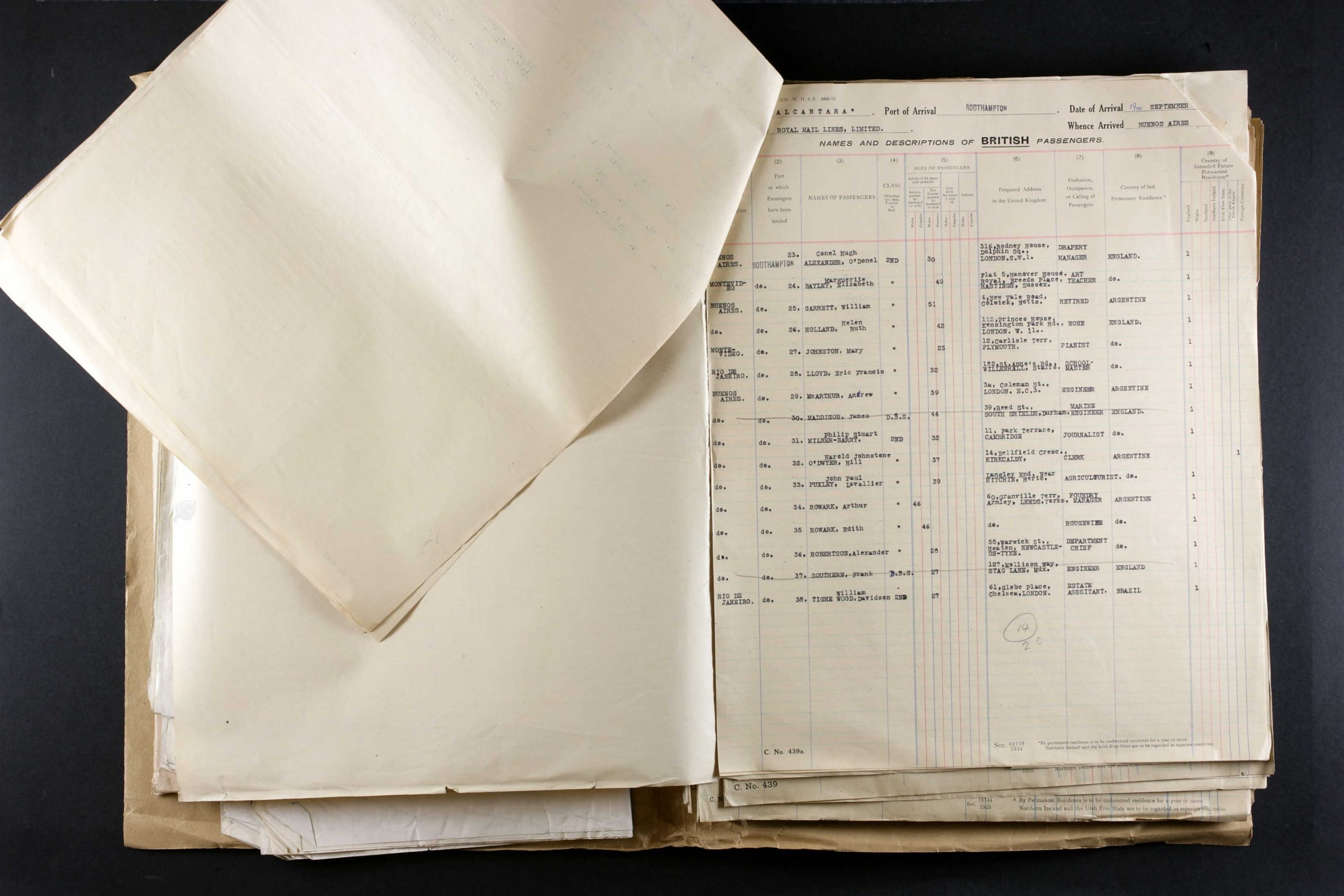
and here is Alexander’s entry in detail. Note that his occupation is described as “Drapery Manager” :

Hugh sailed from Buenos Aires, Argentina in September 1939 to arrive at Southampton September 19th 1939. The ship was the Alcantara operated by Royal Mail Lines Ltd hence the RMS Alcantara.
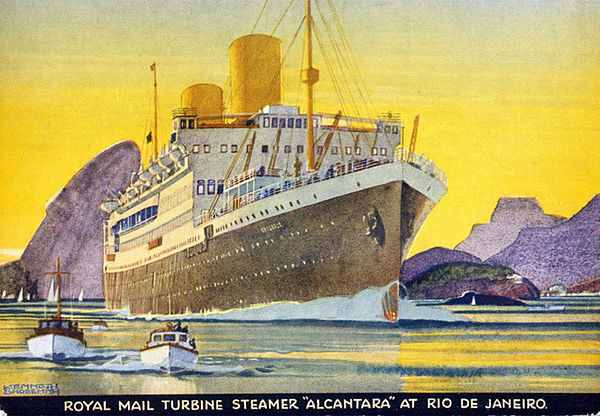
According to Wikipedia : “RMS Alcantara was a Royal Mail Lines ocean liner that was built in Belfast in 1926. She served in the Second World War first as an armed merchant cruiser and then a troop ship, was returned to civilian service in 1948 and scrapped in 1958.
Ports of the voyage were : Buenos Aires; Montevideo; Santos and Rio de Janeiro and Hugh’s official number was 148151 and he travelled 2nd class. His proposed destination residential address was
316, Rodney House, Dolphin Square, London, SW1
According to Wikipedia : “The proximity of Dolphin Square to the Palace of Westminster and the headquarters of the intelligence agencies MI5 (Thames House) and MI6 (Vauxhall Cross) has attracted many politicians, peers, civil servants and intelligence agency personnel as residents.”
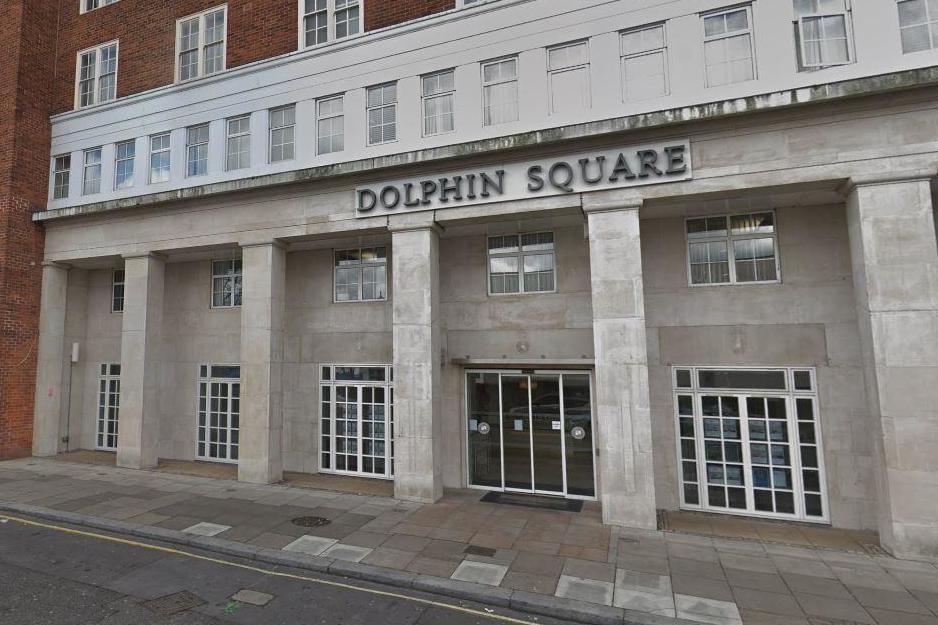
There was some discussion of Drapery Manager in another place.
From British Chess Magazine, Volume XCIV (94, 1974), Number 4 (April), pp. 117-120 by PS Milner-Barry :
“A proper assessment of Hugh Alexander, who died on February 15th 1974 must await a later issue. But I think he might have been pleased to see our last game published, and I give the score of it below, with notes based on our usual analysis immediately after the game. Over the past 45 years, ever since he went to Cambridge, we played whenever opportunity offered serious games with clocks.
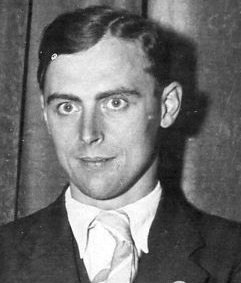
Before the war they were played mostly at my mother’s house in Cambridge, and after the war and my own marriage at our house in Blackheath. When he moved to Cheltenham the opportunities became fewer but no year ever passed without two or three such games, usually at Easter or Christmas.
Alexander always used to say, it was certainly true of me, that this was the kind of chess that he enjoyed most. The games were conducted with the utmost vigour, though not without a good deal of propaganda on both sides. I suppose he won in the proportion of about two to one, but the disparity in strength never became one-sided. Nearly all the games opened 1 P-K4, P-K4; he played the Lopez when I allowed him. (I usually played the Petroff or Philidor), and I played a mixture – in the early days the Vienna and latterly mostly the King’s Gambit. On the whole Black did better than White for both of us.
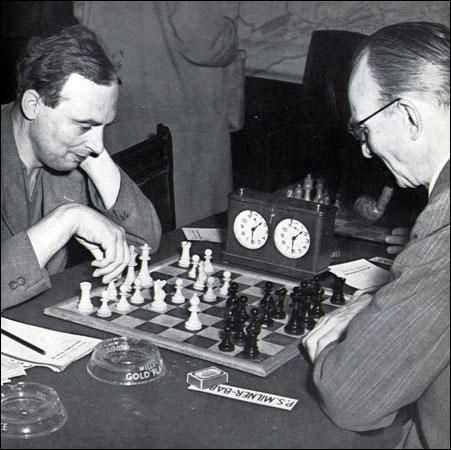
The only concession we made to advancing years was that latterly we contented ourselves with four hour sessions and 36 moves, instead of 40 in 5 hours. We thought we had done enough for honour by then, and the games were usually finished in the time.
Hugh stayed with us the weekend before Christmas, when this game was played. He looked ill, but he was very cheerful and as good company as ever. He loved a good argument, and as my family so too,- the evening meal was its usual lively affair! I am myself a man of peace, and intellectually lazy; so in deference to my feelings the argument was suspended, before it became too hot. I am afraid they all thought I was a spoil-sport. It was as happy a visit as any of us could remember and it is difficult to accept there will not be another.
As for the game, it was not one of our most exciting encounters. But it is quite an interesting one, and shows Hugh playing as
well as ever – certainly much too well for me. But then he usually did.”
Following PSMBs contribution, in the same obituary there was this from Harry Golombek :
I have written elsewhere about Hugh Alexander both as a person and as a chess-player and I also intend to devote a forthcoming article in ‘The Times‘ on Saturday to an appraisal of his place in British Chess. Here, however, I would like to describe briefly his connection with this magazine over the years and to show how
important his help was to the progress of the ‘BCM‘.
In the years immediately preceding the Second World War, Ash Wheatcroft and I had made a determined effort to maintain and increase the role of the ‘BCM‘, he in a managerial capacity and I as its editor. With the coming of war and the departure of both of us into the army a sort of caretaker regime had to be provided. It worked as well as could have been expected but inevitably there had been a decline both in quality and financially. When peace came, the quality improved since it was possible to get more and better contributions but the financial aspect became almost alarming.
The question arose – was there a need for the magazine and if so how could that need be fulfilled with the fairly limited resources at hand. Some of us thought there was, but the ways and means were not so clear. Of all those who thought like this Alexander was the most effective in his approach to the problems. I know that from his very youth onwards he had been convinced of the importance of the ‘BCM’ to British chess and, being a practical idealist, when the
crisis came he set about dealing with it in the most expeditious way.
In November 1946 he became a director of the B.C.M. and continued in that position till February 1952, by which time the magazine had been set on a solid basis from
which it was unlikely to be shaken. It was his idea that Brian Reilly be asked to act as editor and almost his first act as director was to write a letter to him inviting him to become so. Then, in January 1947, he himself took over the editorship of the games department, an arduous task which he fulfilled with great competence and the utmost conscientiousness until May 1949 when the heavy work of the Civil Service department of which he was head compelled him to hand over the Games Section to me.
Before, however, that he gave up this post he, again in the most practical way possible, rendered the ‘BCM‘ another service. He wrote a book giving a selection of the games from the last period of Alekhine’s life and generously donated half the royalties to the ‘BCM‘ in order to bolster up its slender finances.
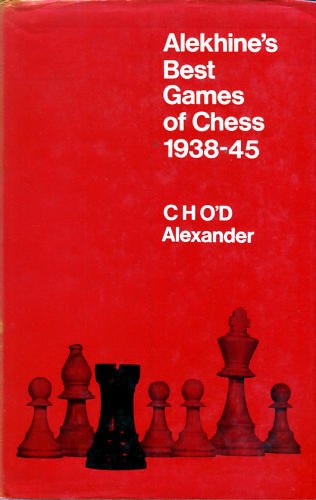
Even after he had to give up official connection with the magazine he retained a strong interest in its welfare. So, even though this recognition is belated and posthumous, I thought it was right to afford readers the possibility of joining with me in thanking High Alexander for all that he did in this respect in especial. At any rate, such matters should be on record for the chess historian.
From The Anglo-Soviet Radio Chess Match by E.Klein and W.Winter :
“CHO’D Alexander was born in Cork in 1909 and learned chess at the age of ten. He was educated at King Edward School, Birmingham, where he exhibited early prowess by winning the Birmingham Post Cup. In 1927 he won the British Boy’s Championship. During his student days, from 1928 to 1932, he was a convincing champion of Cambridge University. Subsequently he competed in five British Championships, winning the title in 1938. He also played in several international tournaments, his outstanding performance amongst these being Hastings in 1938, where he shared second and third prizes with Keres, following Reshevsky who won the tournament, and ahead of Fine and Flohr. In 1939, in the England-Holland match, he had the satisfaction of defeating the ex-World Champion, Dr. Euwe, in a sensational games, drawing the return game.
A brilliant mathematician, he took a first at Cambridge and chose a scholastic career, joining a well-known public school (Winchester College). From there, via a short spell in a business appointment (John Lewis), he entered the service of the Foreign Office, where, during the war years, his valuable work earned him the OBE.
He plays imaginative and courageous chess and is never afraid of the wildest complications.”

From British Chess Magazine, Volume XCIV (94, 1974), Number 6 (June), pp. 202-204 by PS Milner-Barry :
With the death of Hugh Alexander at the age of 64, British chess has lost the outstanding figure of the past forty years. His active playing career over some thirty years included two victories in the British championship and regular appearances in all representative teams from l93l-58, except when the nature of his Civil Service
duties prevented him from travelling behind the Iron Curtain. During the whole of the period after the war he was the regular top board for the England team. In the Hastings international congress he twice won the Premier tournament, on the second occasion tying with Bronstein. His victories in this series included two world champions (Euwe and Botvinnik) and numerous others in the Grandmaster class. He was an outstanding example, like H.E.Atkins and Dr. Milan Vidmar, of the amateur who could combine an exacting professional life of great responsibility and distinction with success in competitive international chess at the highest level and with the increasing professionalism of the game and the demands of knowledge and research that it makes upon the masters, this was much more difficult in Hugh’s time than in an earlier age.
It was indeed in the international field that his fame will principally rest. On the British championship scene, although he always did well before the War, and won convincingly at Brighton in 1938 in a strong field, his record did not match his abilities. He never established anything like the superiority over his contemporaries that Atkins in a former age and Penrose in a later achieved. He won the championship again, in 1956, but that was a weak year when the Moscow Olympiad took first claim on the leading British players. It was not that he cared less – like all the great players he hated losing, though he was the most magnanimous of opponents – but that he seemed to require the stimulus of the great occasion, and of a world famous name on the other side of the board, to bring out the best in him.
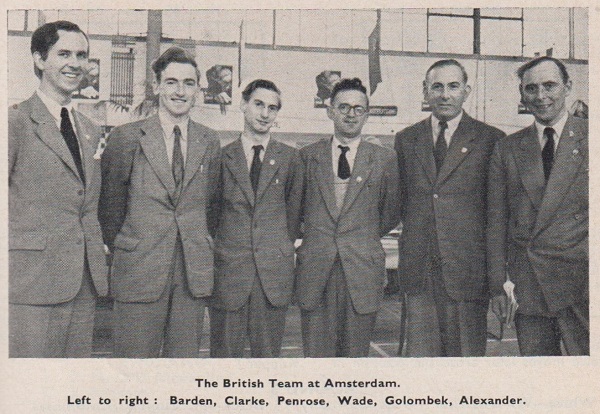
Alexander was perhaps the only English player of his day whom the Grandmasters would have treated as on a level with themselves. On his day he was liable to beat any of them, and they were well aware of it. In his younger days he was very much the gay cavalier, and a brilliant combinative and attacking player with a touch of genius. Latterly he lost some of this elan, and adapted his style to the responsibilities of the B.C.T. top board. His opponents too, with a healthy respect for his powers, were less inclined to give him opportunities. He was as capable of the dead-bat technique as anybody, and to that extent (to my way of thinking anyway) his games became less interesting, with quick draws making a higher contribution to his top-board results than in earlier years. But none the less he was the anchor-man of the British team until his retirement after the 1958 Olympiad.
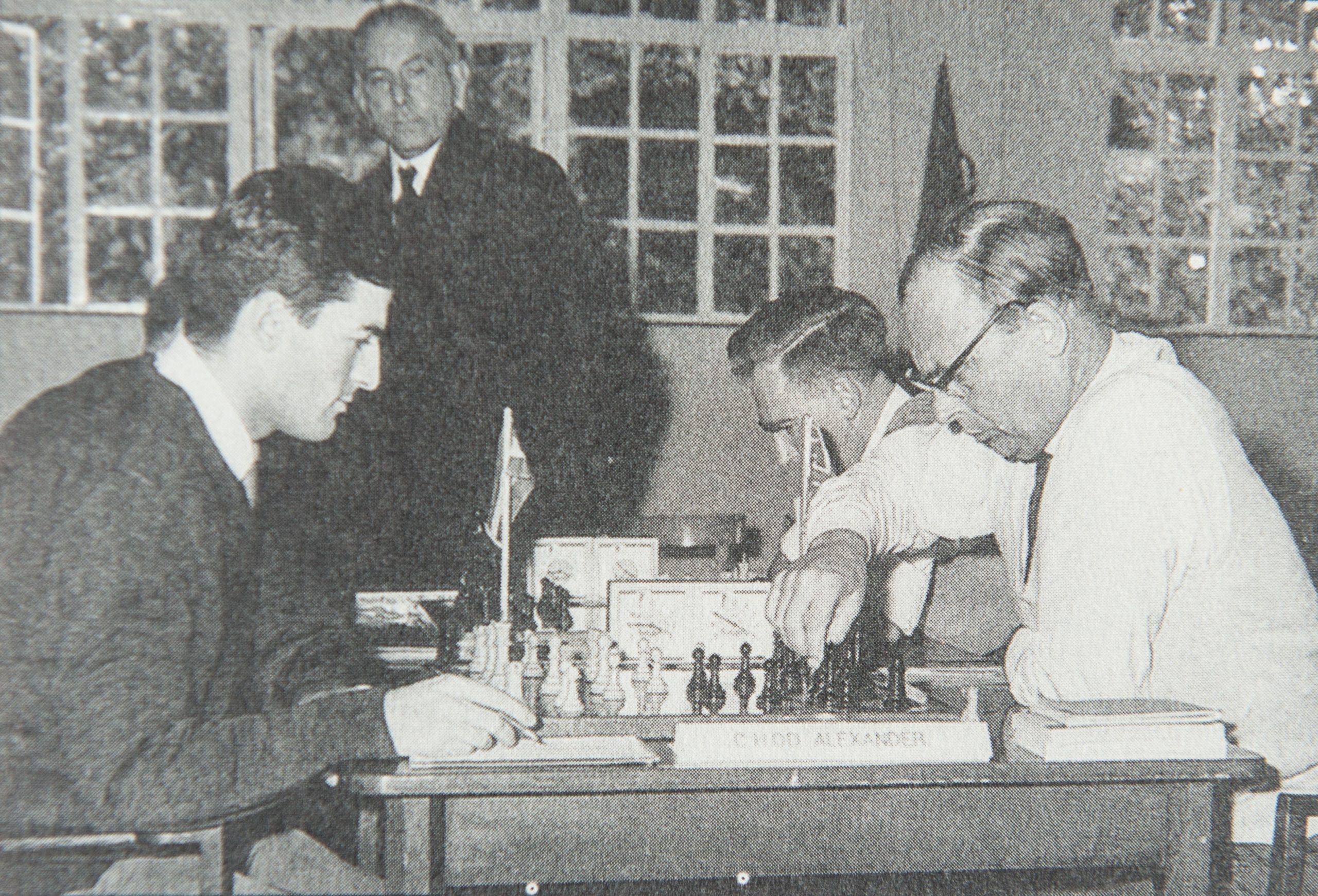
It was a great pity he gave up the game over the board at 50. He had years of good chess in him. But I think he felt he had scaled all the peaks he could scale, and that he was finding top-class competitive chess a burden difficult to reconcile with his Civil Service work and the prospect of a gradual and inevitable decline in his powers did not appeal to him. I made many efforts to tempt him back to the arena, but to no avail. I do not think he ever seriously regretted his decision, and in his last years he immensely enjoyed correspondence chess.
In 1964, Alexander became non-playing captain of the B.C.F. team, and held that role continuously until after the Siegen Olympiad in 1970.
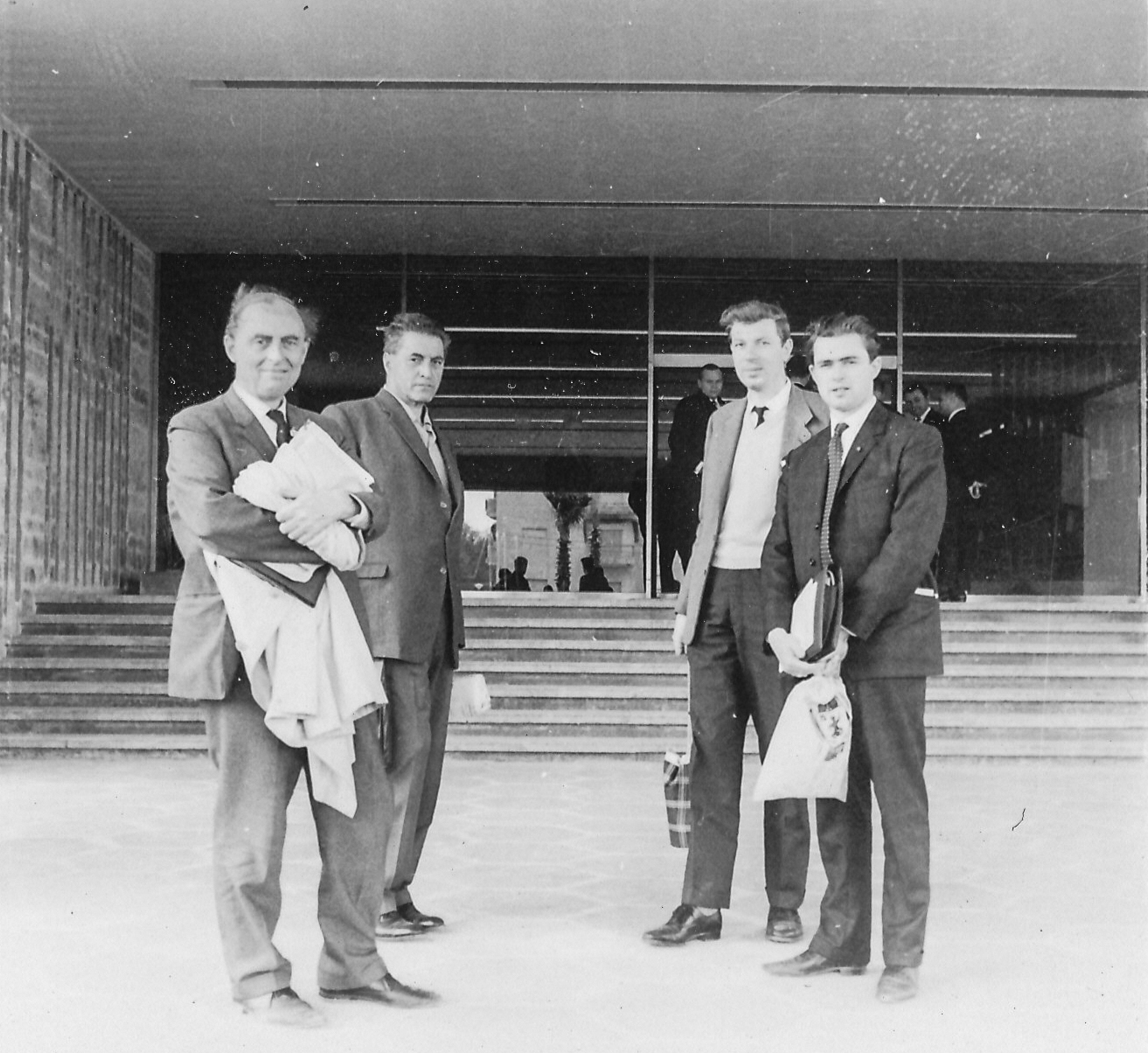
It was rather a disappointing period for British chess, and the results, while we were rebuilding a young team, could not – even with Penrose’s outstanding efforts at top board – have been expected to be favourable. But he threw himself wholeheartedly into all the work sponsored by the B.C.F. and the Friends of Chess to find and develop talent in the younger generation, and before he died the fruits of these labours were beginning to appear. He would have been proud indeed to have witnessed our recent triumph in the Anglo-German match.
As a captain he was, of course, immensely liked and respected by his team. My impression was that he took his responsibilities almost too seriously, and agonised too
much over his decisions about whom to play and whom to rest. Nevertheless on balance he thoroughly enjoyed the work, and certainly, in spite of his innate modesty, he
was never one to be disturbed by ill-informed or irresponsible criticism, of which he had his share.
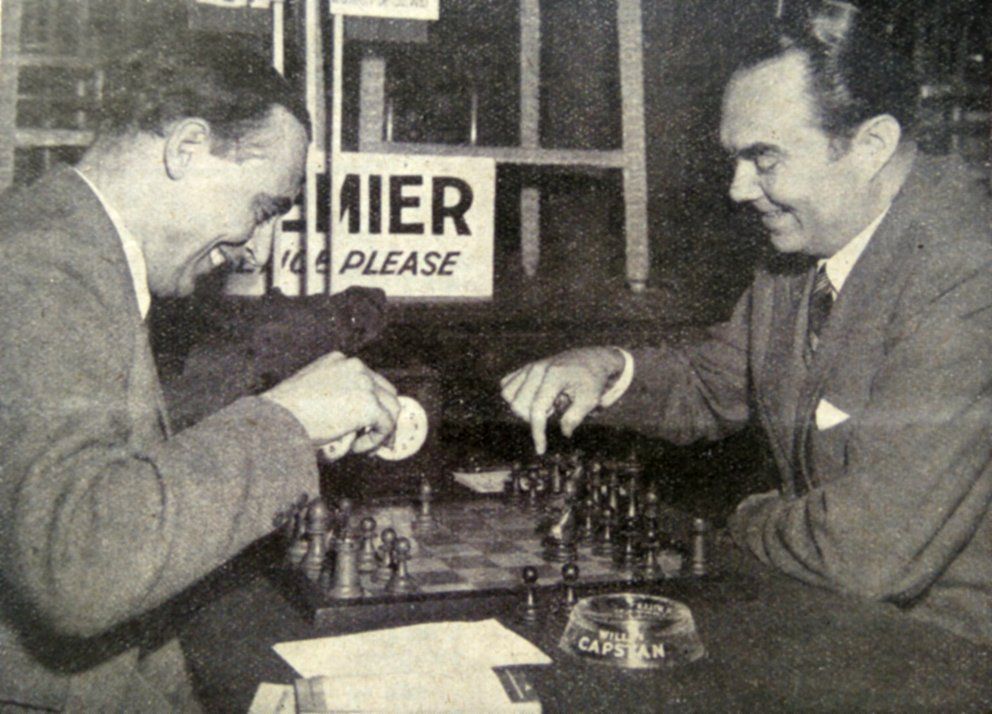
I suppose his most famous tournament result was his equal first with Bronstein at the Hastings Christmas Congress of 1953. Coming at a time when we were gloomily resigned to British players bringing up the rear in international tournaments, this created a great sensation.
The game with Bronstein lasted over 100 moves and Alexander won a most difficult Queen and Pawn ending by impeccable technique.

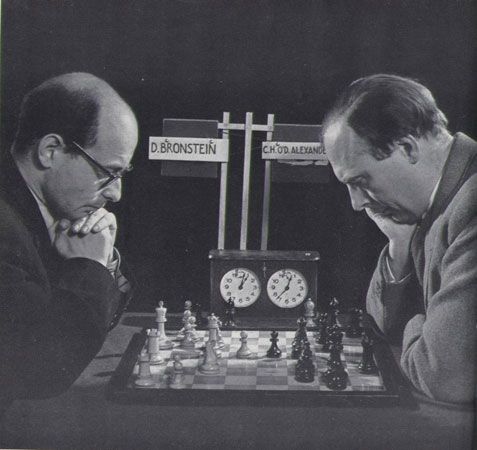
He went on with the Black pieces to massacre Tolush, the other visiting Russian Grandmaster.
Immense interest was created by this event. The popular press carried diagrams of the successive phases of the Bronstein saga. It was reported on the radio. By comparison with the furore created by the Spassky/Fischer match, it was no doubt small beer, but for those days the publicity was tremendous, and Alexander became the
hero of the hour.
It was entirely characteristic of him that this adulation did not go to his head. He kept everything in proportion, and encouraged everybody else to do the same. He said all the right things about Bronstein, but he did not claim, as one tends to do on these emotional occasions, that international sport was a panacea for friendship between the nations. Altogether it seemed to me an impeccable performance both on and off the board.
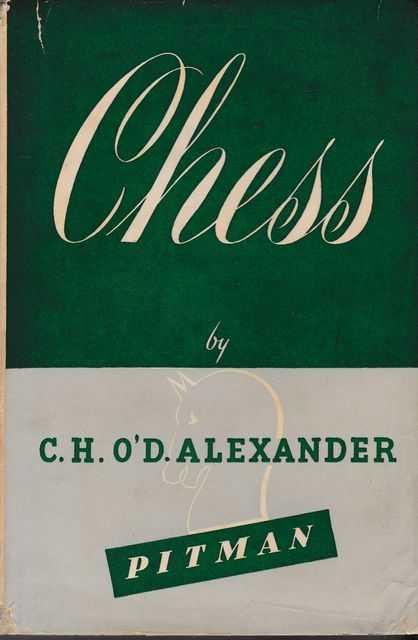
It is as a player that Hugh would, I think, have best wished to be remembered; and I have left myself little room to say anything about him as a journalist and writer. We are blessed, as readers of the B.C.M. will know, with many good and interesting writers on the game. But Hugh had, I believe, exceptional talents as a journalist. In his columns in the ‘Sunday Times‘, and latterly the ‘Financial Times‘, he set a very high standard. He always had something fresh and original to say, especially, I think, to the intelligent amateur rather than the expert; and he said it in a way that was both disarmingly modest and yet lively and entertaining. The warmth of his personality came out clearly both in his writing and in his public speaking – both were entirely natural and wholly without amour-propre.
His articles gave great pleasure to a wide circle, and many who never met him in the flesh must have felt that they had come to know him as a person. Similarly his book on the Spassky-Fischer match
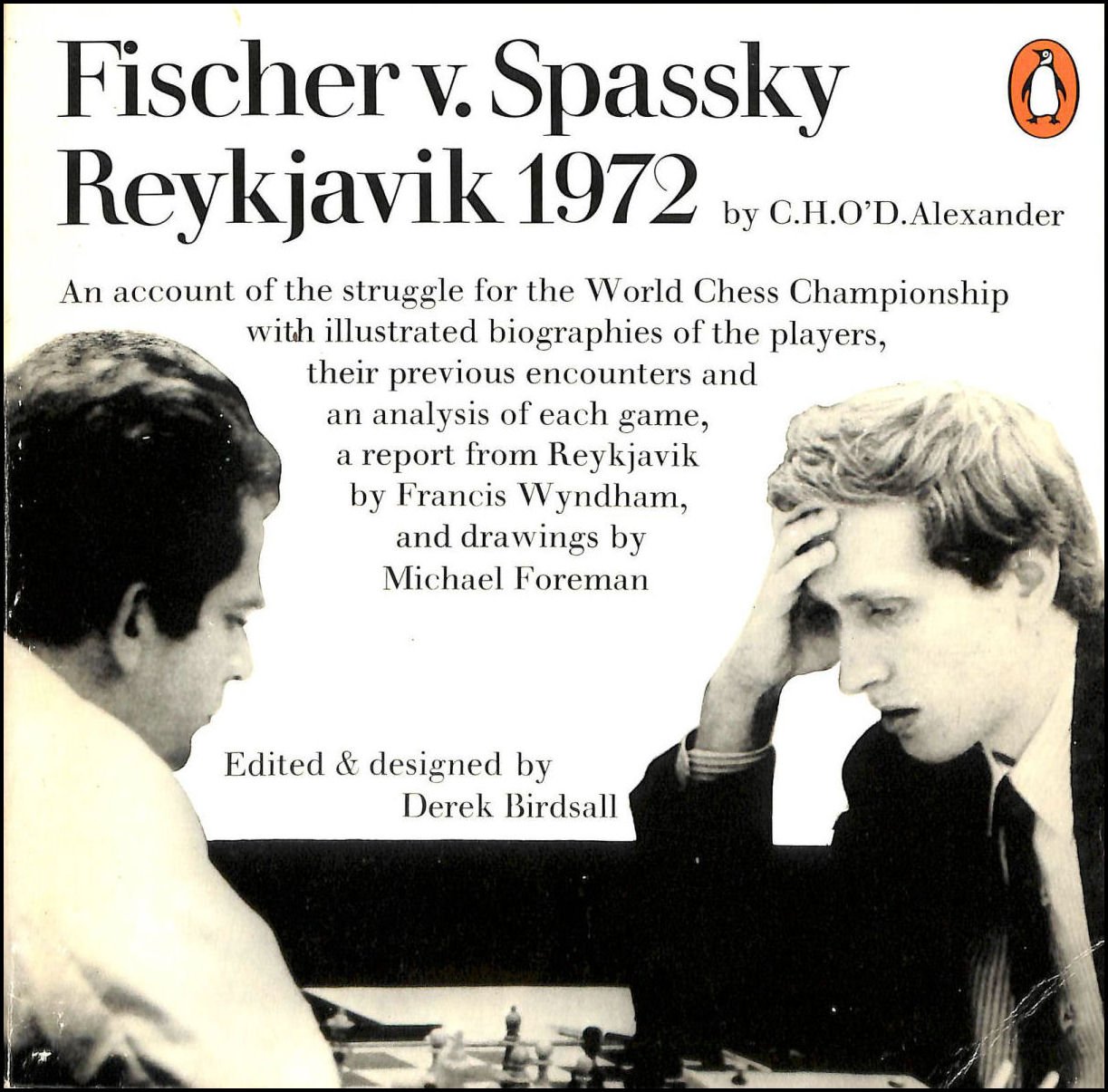
(like the ‘Book of Chess’, which was written in the last year of his life) is an extremely vivid, as well as scholarly, piece of writing. It is almost impossible to believe that it was completed, within days of the conclusion of the match, by a man apparently under sentence of death throughout its progress.
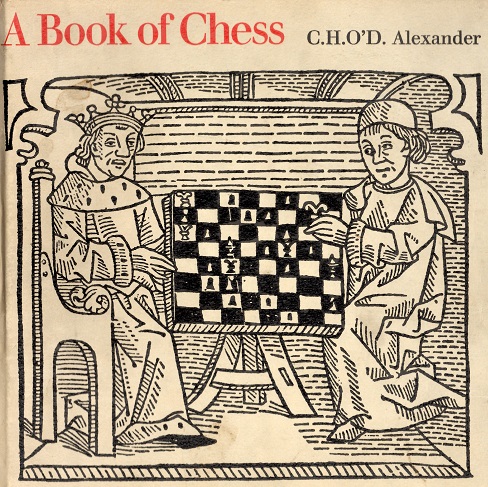
Now that it has come, the loss of Hugh Alexander to British chess and chessplayers, alike as player, writer, administrator and friend, is immeasurable.
From CHESS, Volume 39 (1974), Nos. 693-94, March, p.162 by BH Wood :
The death of Conel Hugh O’Donel Alexander deprived English chess of one of its most vivid characters. Born l9th April 1909, he learnt chess at the age of 8.
From a Londonderry college he went to King Edward’s School, Birmingham, where as a schoolboy he won the Birmingham Post cup, which carries with it the unofficial championship of Staffordshire, Warwickshire and Worcestershire. Going on to Cambridge, he not only won the University championship four years in succession, but picked up first-class honours. He won the British championship in 1938.
In 1939 I found myself on a boat with him bound for the Chess Olympiad in Buenos
Aires. He was team captain with Sir George Thomas, P. S. Milner-Barry and H. Golombek
other distinguished members of the team.
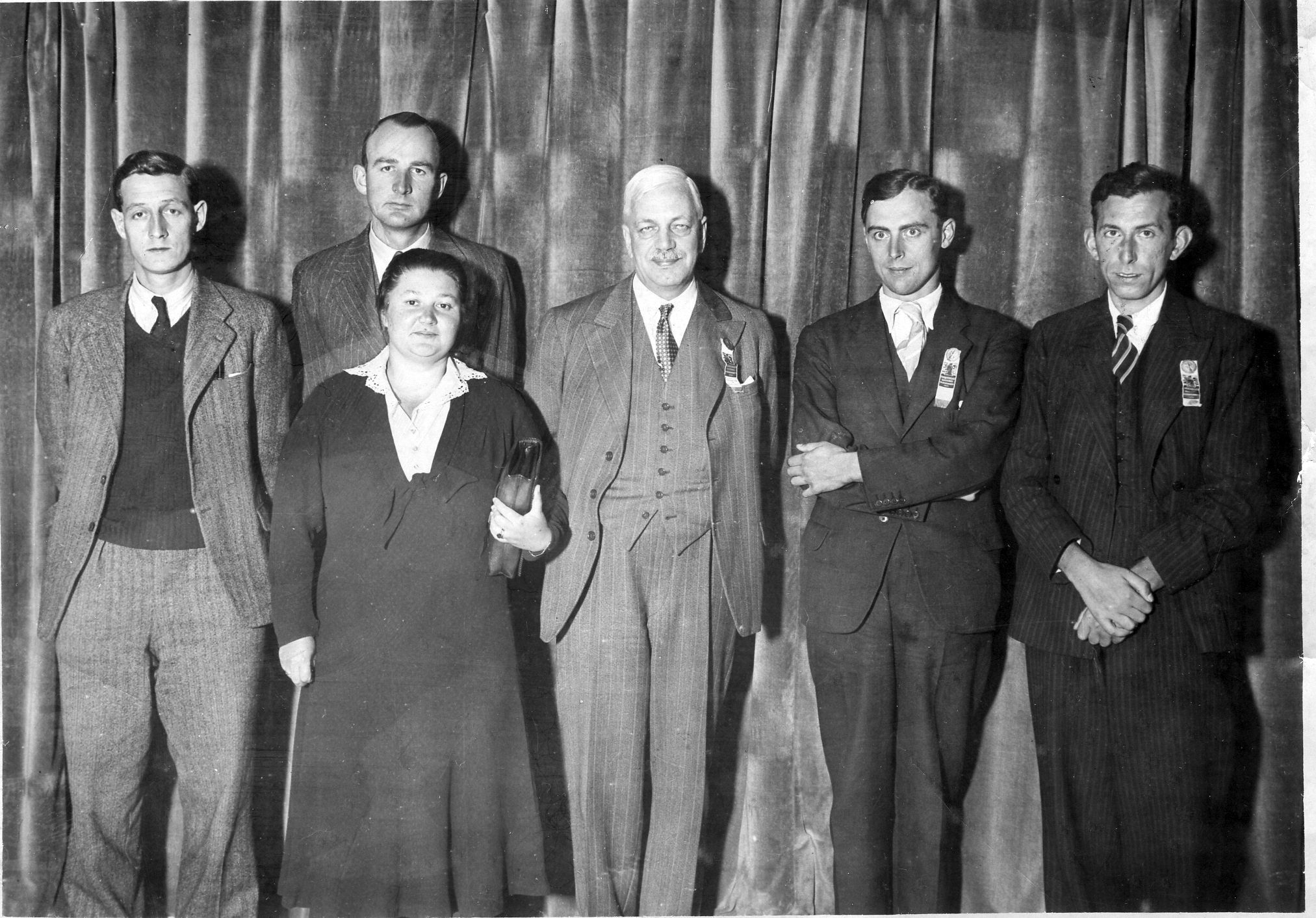
War broke out after about six rounds. With typical determination, Alexander jettisoned chess for patriotism, caught a boat home, volunteered for service on disembarking, and within a few weeks had attained the rank of colonel in British Intelligence. He remained attached to Intelligence and the Foreign Office until his
retirement a few months ago. As a curious consequence of this commitment, though he settled in to the team captaincy for the British Chess Federation in the biennial chess Olympiads and participated in many chess events abroad, he was never allowed to travel anywhere behind the iron Curtain.
His fame certainly did, however. In the radio match, Britain v USSR in 1946, the most important event in British chess for a decade before and after, he found himself pitted against Mikhail Botvinnik, then at the height of his powers and destined to hold the world championship for 14 years. The first game he lost; the second he won, in superb style. His great adversary was outplayed.
He had some great years at Hastings. A 120 move victory over Bronstein with a queen and pawns endgame stretching over l3 hours through 3 days, earned headlines in the national press unequalled until the Spassky-Fischer furore of 1972, won him first place in 1954 and started him with a chess column in the Sunday Times. He was equal with Bronstein, above O’Kelly, Matanovic, Olafsson, Teschner, Tolush, Tartakover, Wade and Horne.
Hastings illustrated Alexander’s weaknesses as well as his strengths. Twice he won the premier tournament there, only to finish among the tail-enders the year after. Only once more was he to win the British champ- ionship; in a rather weak field, entering at the last minute with typical opportunism.
He was a brilliant conversationalist and speaker, a fine bridge player, a master mathematician, an expert on codes, a first-class journalist and writer. Among varied other interests were croquet and philately. He threw himself wholeheartedly into anything he did. His organization, “The Friends of Chess”, provided generous financial support for a wide range of chess events. A few days before his death he was full of plans for the future, including a big History of British Chess. He burnt himself out. The world of chess is a poorer and duller place without him.”
From Chessgames.com :
“Conel Hugh O’Donel Alexander was born in Cork, Ireland. Awarded the IM title in 1950 at its inception and the IMC title in 1970, he was British Champion in 1938 and 1956.
During the Second World War, he worked at Bletchley Park with Harry Golombek and Sir Philip Stuart Milner-Barry, deciphering German Enigma codes and later for the Foreign Office. Alexander finished 2nd= at Hastings (1937/38) tied with Paul Keres after Samuel Reshevsky and ahead of Salomon Flohr and Reuben Fine. He held Mikhail Botvinnik to an equal score (+1, -1) in the 1946 Anglo-Soviet Radio Match, and won Hastings (1946/47) while finishing equal first at Hastings (1953/54). He represented England on six Olympiad teams. Alexander was also an author of note. He passed away in Cheltenham in 1974.”
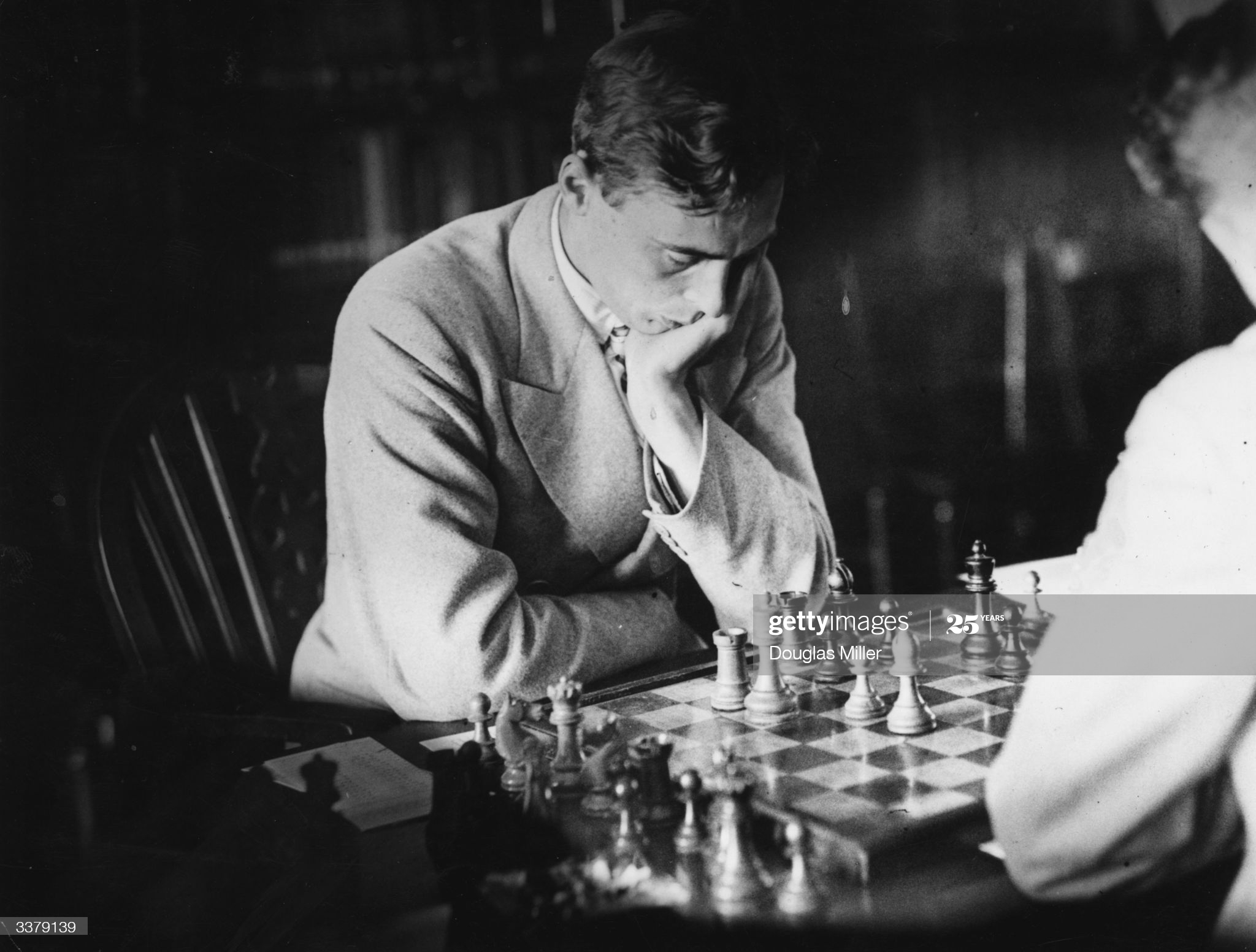
From The Oxford Companion to Chess by Hooper & Whyld :
International Master (1950), International Correspondence Chess Master (1970). Born in Cork, he settled in England as a boy. In spite or because of his intense application at the board his tournament performances were erratic. From about 1937 to the mid 1950s he was regarded as the strongest player in Great Britain, although he won only two (1938, 1956) of the 13 British Chess Federation Championships in which he competed; he played for the BCF in six Olympiads from 1933 to 1958. Holding a senior post at the Foreign Office, he was not permitted to play in countries under Soviet control or influence; but when he did compete abroad he achieved only moderate results. His best tournament achievement was at Hastings 1937-8 when he was second (+4=5) equal with Keres after Reshevsky ahead of Fine and Flohr; but he is better remembered for his tie with Bronstein for first prize at Hastings 1953-4. He won his game against Bronstein in 120 moves after several adjournments, and the outcome became a kind of serial in the press, arousing great national interest in the game. Alexander was the author of several books on chess, notably Alekhine’s Best Games of Chess 1938-1945 (1949) and A Book of Chess (1973).
From The Encyclopaedia of Chess by Anne Sunnucks :
For many years the chess correspondent of The Sunday Times, The Spectator (pseudonym Philidor) and the Evening News. There was probably no “chess name that was better known to the non-chess-playing element of the British public than that of Hugh Alexander. His victory over Russian Grandmaster David Bronstein at Hastings in 1953, after a struggle which lasted for 120 moves and took 13 hours, made chess front page news in the British press.
Born in Cork on 19th April 1909, Alexander picked up the game at prep school at the age of 8. In 1926 he won the Boy’s Championship, later to be recognised as the British Boy’s Championship, at Hastings. After coming down from Cambridge University, where he won the university championship four times, Alexander taught mathematics at Winchester College from 1932 to 1938. He later joined the Foreign Office.
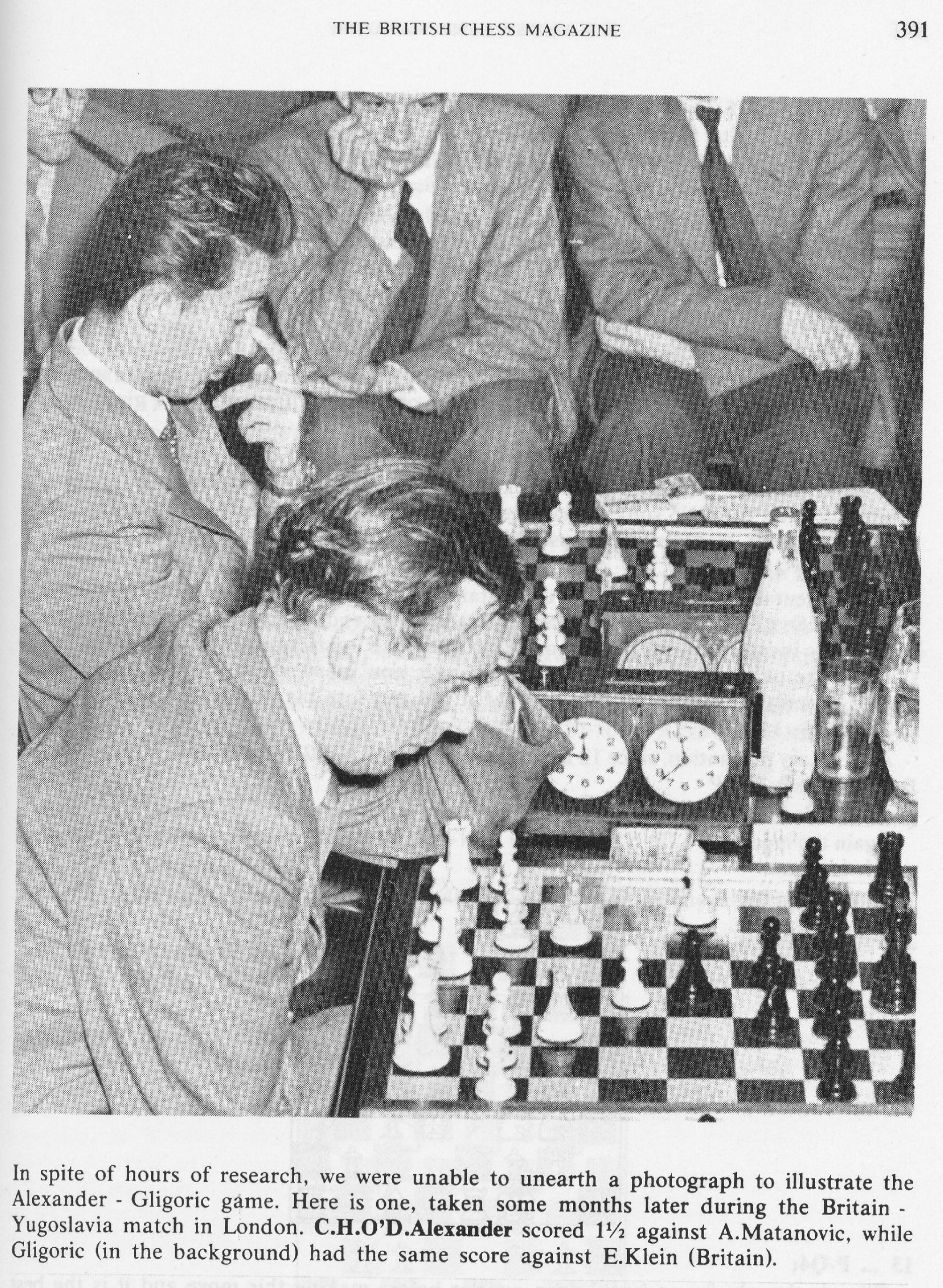
One of the few British players who might have reached World Championship class if he had chosen to devote sufficient time to the game, Alexander was at his best when he faced a top class opponent.
During his chess career, he scored victories over two World Champions Botvinnik and Euwe, and he beat a number of other Grandmasters, international tournaments were all at Hastings where he came =2nd in 1938 with Keres, half a point behind Reshevsky and ahead of Fine and Flohr; 1st in 1947 and =1st with Bronstein in 1953. In 1951 tournament he came =5th.His other hobbies included bridge, croquet and philately, He was the Author of Alekhine’s Best Games of Chess 1938-1945 (Bell), Chess (Pitman) and joint author with T.J. Beach of Learn Chess; A New Way for All (Pergamon Press);
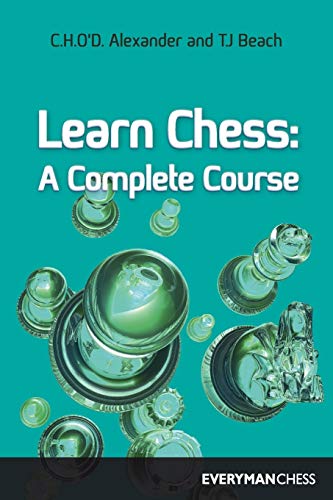
A Book of Chess (Hutchinson) 1973; The Penguin Book of Chess Positions (Penguin) 1973.
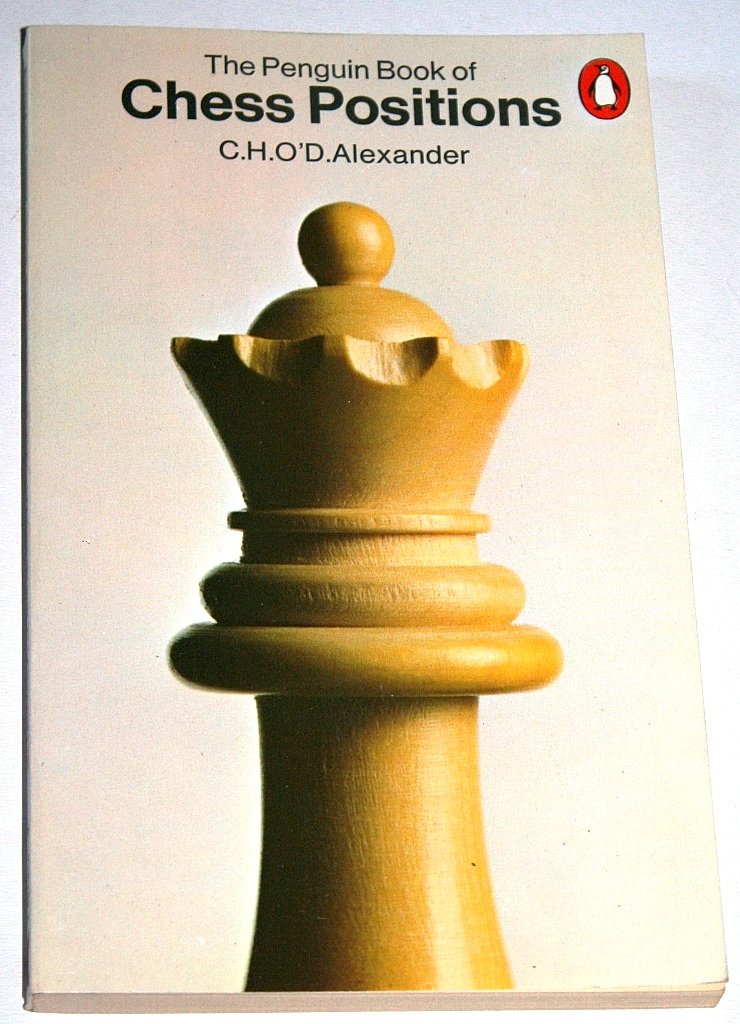
Here is an interesting article on his film appearance.
Here is his detailed Wikipedia entry
According to C.N. 10817 Hugh lived at various addresses when working at GCHQ :
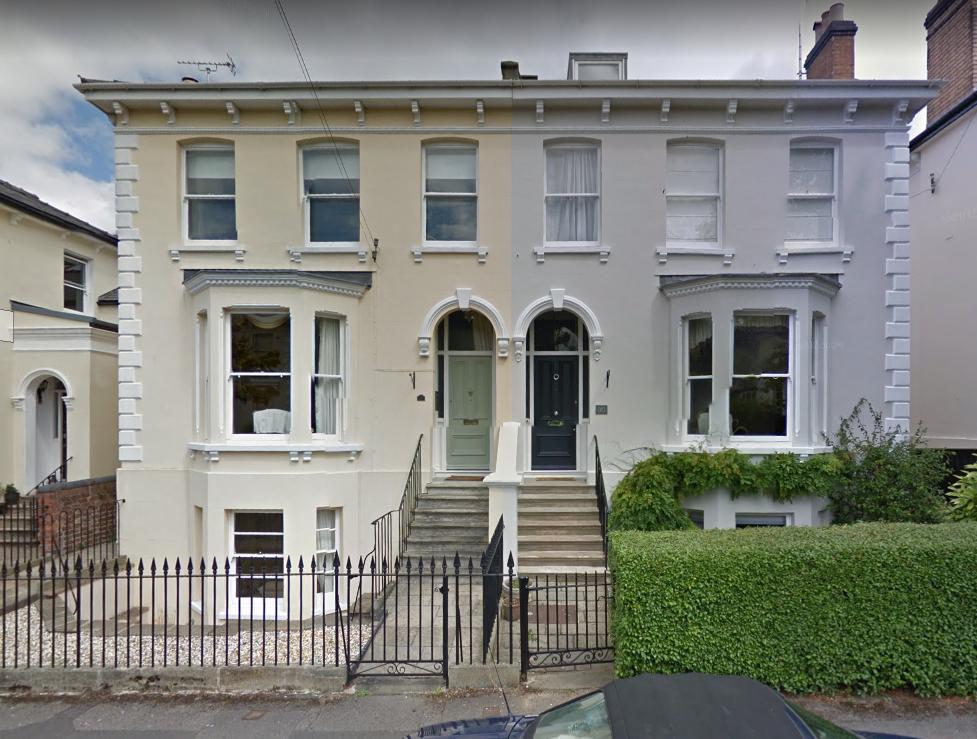
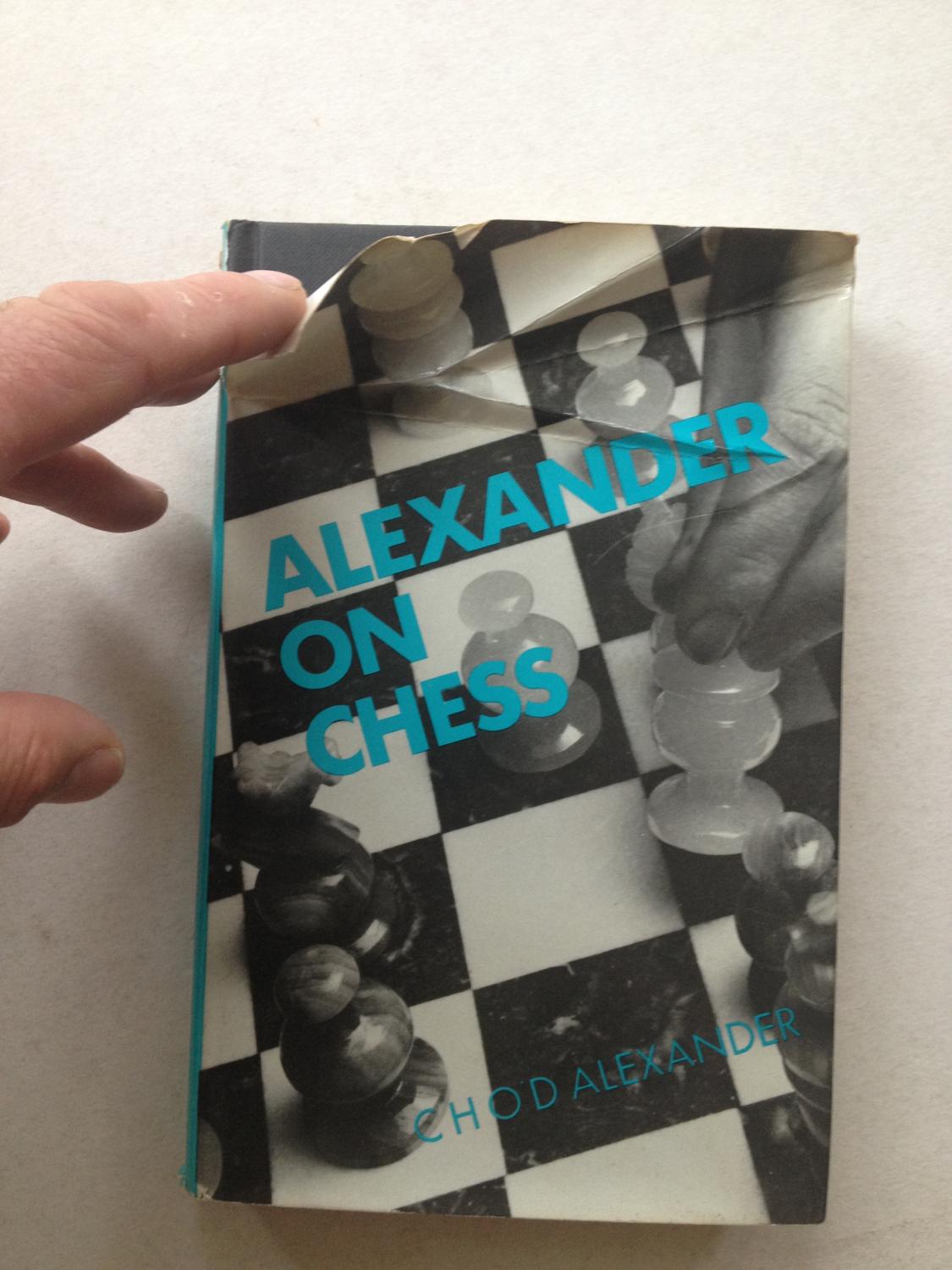

Golombek and Hartston, The Best Games of C.H.O’D. Alexander (1976).